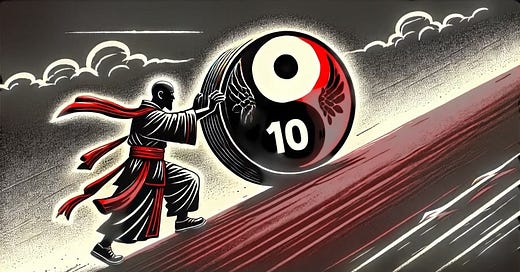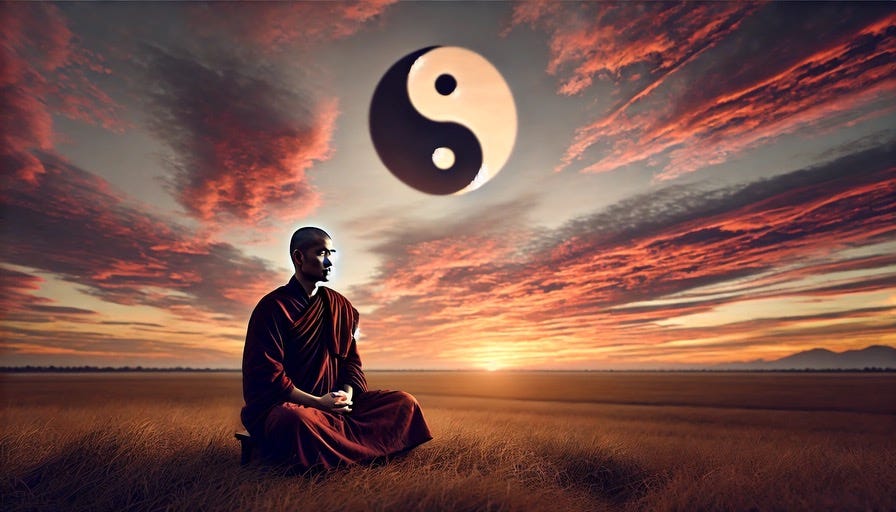The results are in, the votes are counted, and half the nation is clutching its pearls while the other half is cracking champagne. It doesn’t matter which election we’re talking about—this is the standard playbook.
It’s almost a tradition now, like Thanksgiving dinner, but with fewer mashed potatoes and more doomsday scenarios. Every election, one side declares that civilization as we know it is ending, while the other side claims it’s finally beginning. Meanwhile, the Tao, unmoved by our human melodrama, just keeps on flowing.
It’s human nature to catastrophize. You lose your job, and suddenly you’re envisioning a life of destitution, eating cold beans under a bridge. Someone ghosts you on a dating app, and you’re convinced you’ll die alone.
The stock market takes a dip, and next thing you know, you’re hoarding canned goods in your basement because, clearly, society is about to collapse. We’re masters at taking a molehill and turning it into Everest.
But let me tell you something: I’ve quit this game. I no longer subscribe to the catastrophic newsletter of human nature. Instead, I’ve become a curiosity junkie, chasing down the mysteries of life like a kid chasing an ice cream truck. It’s far less stressful, infinitely more interesting, and Zhuangzi would absolutely approve.
The Catastrophe Machine
Catastrophizing is a uniquely human affliction. Evolutionarily, it probably made sense. If you were an ancient hunter-gatherer and you heard a rustle in the bushes, assuming the worst (saber-toothed tiger) might save your life.
But in the modern world, the rustle in the bushes is usually just the wind—or, at worst, your nosy neighbor. Yet here we are, still assuming tigers lurk behind every corner, whether the corner is an election result, a text message left on read, or a new strain of the flu.
Zhuangzi, the ancient Taoist philosopher, would shake his head at us. In his whimsical parables, he pokes fun at human beings for taking life so seriously. To Zhuangzi, life is an ever-changing, unpredictable dance. Trying to control it or impose our own narratives on it is like trying to wrestle the wind.
Spoiler alert: the wind always wins.
Zhuangzi once dreamed he was a butterfly, fluttering about without a care in the world. When he awoke, he couldn’t tell if he was Zhuangzi dreaming he was a butterfly or a butterfly dreaming he was Zhuangzi.
The point? Life is ambiguous, and our rigid interpretations are laughably inadequate. So why waste time catastrophizing when you could be exploring life’s mysteries instead?
Curiosity as a Counterweight
Here’s the thing about curiosity: it’s a natural antidote to anxiety. When you’re curious, you’re open. You’re asking questions instead of jumping to conclusions. You’re looking at life with wonder, not fear. Instead of catastrophizing about what might go wrong, you’re fascinated by what might unfold.
This mindset shift has been a game-changer for me. Take the election hysteria. While everyone else is breathlessly predicting the end of democracy or the dawn of utopia, I’m over here wondering: What does this moment say about us as a species?
What are the hidden lessons, the ironies, the opportunities for growth? I don’t need answers right away. The questions themselves are enough to keep me engaged—and sane.
Zhuangzi’s Election Commentary
If Zhuangzi were alive today, I suspect he’d have some fun with our election drama. He’d probably tell a parable about a frog in a well, convinced that its little patch of sky is the whole universe.
The frog argues passionately about the shape of the sky, oblivious to the vastness beyond its well. Sound familiar? That’s us, clinging to our limited perspectives, certain that our version of reality is the only one that matters.
Zhuangzi might also remind us that the Tao doesn’t care who wins or loses an election. The Tao is about balance, flow, and transformation. What looks like chaos to us might be the natural unfolding of a larger harmony. If we could step back, zoom out, and embrace the mystery, we might find ourselves less anxious and more at peace.
Shutting Down the Catastrophe Factory
Catastrophizing doesn’t make life safer—it just makes it smaller. Curiosity, on the other hand, expands your world. It turns every moment, even the stressful ones, into an opportunity for discovery.
So the next time you catch yourself spinning out over the latest disaster du jour, pause. Ask yourself: What would Zhuangzi do? He’d probably laugh, lean back, and let the wind carry him where it will.
And maybe, just maybe, we should all try doing the same.
I invite you to subscribe today as a member supporter. Or I’d be grateful if you’d tip me some coffeehouse love here. Your contributions are appreciated!
Every bit counts as I strive to deliver high quality feature articles into your inbox on a daily basis. Never any paywalls, just my raw thoughts which are open to everyone on what it means to be human.
Much Love,
Diamond Michael Scott — aka The Chocolate Taoist






Curiosity is a state of presence. It’s something we can cultivate. I consider myself a curious person and at the same time, I hate to admit it, I can also be judgmental. I think it’s because I’ve been conditioned to feel that I must make quick assessment, scanning the field for danger as a survivor to keep my out of harms way. It’s very much a ‘fear based’ way of orienting towards the world.
I am challenged by ‘anticipatory anxiety’ — fearing the possible worse outcomes as if that we’ll give me a greater sense of control. It’s an illusion though. Anxiety doesn’t serve me. It took the longest time to come to that basic reality.
The election outcome hasn’t exactly made me feel any more secure. The 24/7 news cycle isn’t helpful either as it’s not offering anything particularly hopeful. Just more doom and gloom.
I appreciate Zhuangzi’s prescription for dealing with uncertainty with laughter. It seems to be the ultimate in surrender. Sometimes, I can go there. Other times, I just want to cry. I want to mourn. But, this is not encouraged in our culture. We’re told to ‘laugh’ it off. I’m not sure that’s always the best approach when we’re faced with oppressive forces from our present or our past. If we haven’t processed the past, I don’t think there’s an appropriate framing for the future.
I feel that there are no spaces to grieve, to process, to mourn, to self reflect, to gather, to connect with others, in part, because there’s a continual emphasis on efficiency, the lack of time, the need to be ‘on top’ of all the latest news, all of the ‘developments’. It’s a constant chase to catch up.
What am I chasing?
Time for me to slow down. Time for me to meditate. Time for me to mourn. I find it’s time to read ‘The Wild Edge of Sorrow’ at a time it feels that the world is coming unglued. That feels honoring.
I guess I’m in another space right now. And I do appreciate your perspective.
Wise words, Diamond-Michael. Thanks for the reminder. I’ve always been a highly curious person by nature, but I admit this recent election result has me quite concerned.